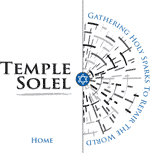This week's Torah portion (Parshat Emor) contains one of the Torah's iconic notions. According to Leviticus 23:22: "When you reap the
harvest of your land, you shall not completely reap the corners of your field,
and the gleanings of your harvest you shall not gather. For the poor and the stranger you shall leave
them, I am Adonai your God."
More than any other image in the Torah about the giving of tzedakah, and the obligation to feed the hungry, this is the one that speaks to me the most. In plain terms, the Torah is making a radical statement: that just because a person might own a given piece of land...It does not mean that he/she actually has the right to claim/keep all of the monetary value of that land to herself. Let's say the landowner grows corn...According to this week's Torah portion and the mitzvah of peah (literally: a corner), the corn in the corners is left unharvested. The farmer doesn't get to sell it in the market, or eat it in his home. It remains in the field. So that the poor can come by at their convenience (perhaps at night so as to minimize public shame) to eat and be filled.
I also love this idea because it is so radically destabilizing to the capitalism that we have all been brought up to believe in here in America...that what we earn: we get to keep for ourselves!
Not so, according to Judaism. We should be humbled to know that whatever wealth/materialistic comforts we have are gifts that are but lent to us. And the time is going to come when we are going to be expected to return them.
In the meantime, we are specifically commanded to share what we have with others. (This would be the cue for Craig's "Share and Be Nice" song...)
The agricultural imagery of the Torah portion might lead you to think that none of this is relevant today. After all: how many Jewish farmers do you actually know?
But I would argue that the farming piece is the least relevant part of peah.
Consider, for a moment, the words of Rabbi Samson Raphael Hirsch, who wrote this about this week's Torah portion (gender sensitive translation!): "For the wealthy person
who cares for the needy of her people merely fulfills her duty to God. This duty was thrust upon her with every
grain of produce that God caused to grow in her field. This concept of tzedakah is the
greatest of the Torah’s social triumphs."
The triumph that Hirsch is referring to is not about farming per se. It is the reminder and realization that our wealth (represented for us by a physical paycheck, or the numbers on the screen of the webpage of our bank account) comes to us from God...or some other power or Force in the world, depending on your theology. According to Judaism: we have to share our wealth....because the wealth actually doesn't belong to us in the first place.
Given how trendy and hip Eastern spiritual practices are right now...it's worth noting that karma is also a long-held Jewish idea.
In the 15th century, Rabbi Isaac Caro (teacher and uncle of the more famous Rabbi Joseph Caro) wrote: "The reason that the poor
person is poor is because the rich person is rich. When your star ascends, his star
descends. [Our tradition teaches us that you, the rich person] are the reason that he
is poor. And if you do not give to him,
what will God do? God will rotate the
universe in such a way that the star that is on top will sink to the bottom, and
the star that is on the bottom will rise to the top."
The material wealth that we enjoy is simply the result of a cosmic accident, according to this view. The wealth had to be split up somehow...and it fell to us, and not to "them." But if we don't exercise a little humility about that...and if we fail to support those whose needs are significant, then...according to Caro, God will punish us...by turning our worlds literally upside down, so that everyone's economic position is reversed.
The lesson here is clear: if we want to avoid having our universe upended, we need to plant our feet firmly to the ground....to stay humbly grounded about who we are, and what it means to be able to acquire and spend wealth. We are commanded....not invited...but specifically ordered to share what we have with others who need it more than we do. How wonderful it would be if that generosity of spirit might touch us all, and enable us to feed the world, and heal it, by transforming it into a better place.
Shabbat Shalom,
Rabbi Brown
PS: If you are interested in the topic of Judaism and Social Justice, I highly recommend Rabbi Jill Hammer's There Shall Be No Needy: Pursuing Social Justice Through Jewish Law and Tradition.
PPS: 3 organizations that you might make a small donation to (whether it's $3, $36, or $360 - and do it in honor of Mom this Mother's Day weekend!) are:
- www.mazon.org - Mazon is the foremost American Jewish response to hunger.
- www.ajws.org - American Jewish World Service is a leading Jewish organization that sends volunteers to impoverished communities around the world.
- http://bendthearc.us/ - Bend the Arc is a new Jewish partnership to fight for a greater sense of justice in our world.





No comments:
Post a Comment